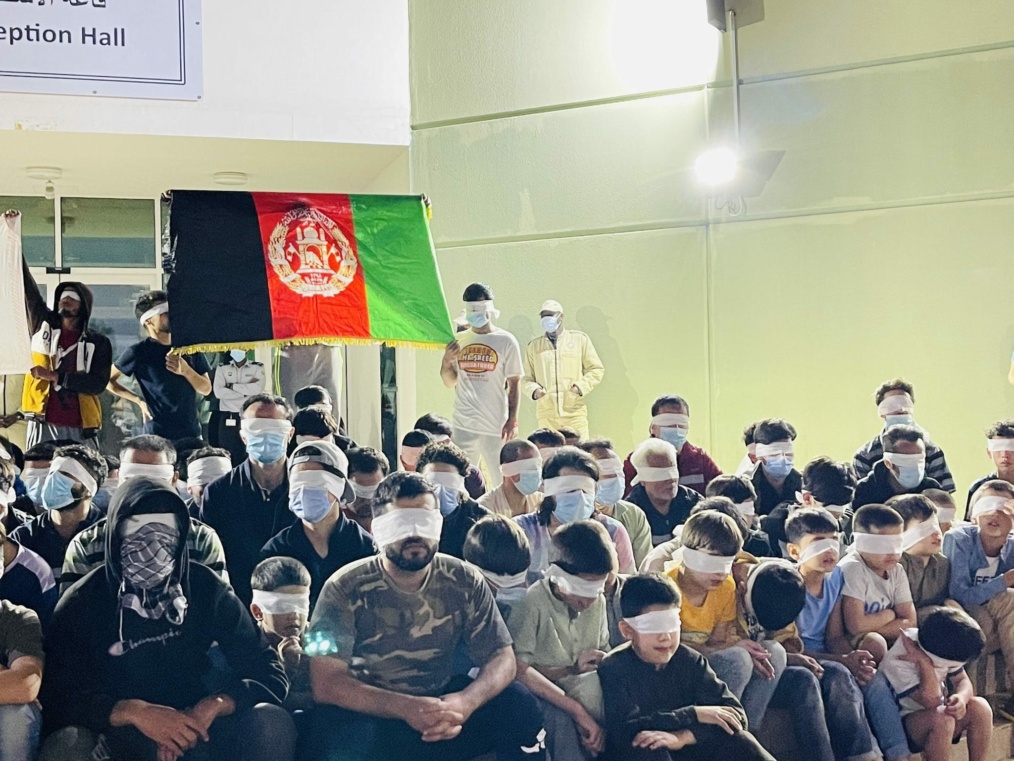
Afghan evacuees in UAE still wait to be resettled in US
Tens of thousands of Afghan evacuees at Emirates Humanitarian City (EHC) and the Tasameem Workers City (TWC) in Abu Dhabi, United Arab Emirates (UAE), seeking answers from U.S. Government (USG) while in limbo.
Following the August 2021 collapse of the Afghanistan government and subsequent takeover by the Taliban, the U.S. military evacuated over 100,000 people from Afghanistan during the largest noncombatant evacuation operation (NEO) airlift in history. While tens of thousands of these evacuees were brought into the U.S., others are still in limbo in third countries.
During the NEO operation, the United Arab Emirates agreed to temporarily house an estimated “5000” evacuees in their Emirates Humanitarian City refugee camp while the U.S. could process their immigration cases. The USG evacuation was operating normally with 2-3 chartered flights from the UAE to the U.S. until November 07, 2021 where flights suspended.
On February 09, 2021, evacuees protested “demanding” answers from the U.S. government which resulted in mass media coverage and eventually grabbed the attention of the US government officials. On February 15, 20 representatives of evacuees (10 women and 10 men) held a meeting with the U.S. State Department and UAE officials, it was announced that the evacuees had agreed to temporarily end their demonstrations to allow their cases to be processed.
BREAKING: Afghan refugees arrested by UAE officials in EHC refugee camp, Abu Dhabi, as they demanded answers from @StateDept after 6 months of being at limbo. An evacuee told me, “US government brought us here in August and forgot about us…now seeking answers, we get arrested” pic.twitter.com/pFteC2A60V
— Ahmad Shah Mohibi (@ahmadsmohibi) February 9, 2022
Unlike other Afghan refugee camps in Ramstein Air Base in Germany and US army base in Qatar where evacuees have had relatively quick entry processes into the U.S., these individuals live in a state of fear and uncertainty as to their futures.
Evacuees have criticized the insufficient amount of personnel at the site to process and transfer them out of the camp. Additionally, individuals report that when they seek answers from U.S. Embassy staff about their transfer status, they are told a generic answer that lacks clarity.
https://twitter.com/ahmadsmohibi/status/1491898712024625155?s=20&t=RSKn0nZPfrVhQzmDI-CrgA
BREAKING: Afghan refugees arrested by UAE officials in EHC refugee camp, Abu Dhabi, as they demanded answers from @StateDept after 6 months of being at limbo. An evacuee told me, “US government brought us here in August and forgot about us…now seeking answers, we get arrested” pic.twitter.com/pFteC2A60V
— Ahmad Shah Mohibi (@ahmadsmohibi) February 9, 2022
Afghan refugees in UAE protest months-long wait for resettlement https://t.co/GezOp3WGSj pic.twitter.com/7HUAgs9SWQ
— Reuters (@Reuters) February 11, 2022
This is not the first time Afghan evacuees have protested for U.S. resettlement. In November 2021, Rise to Peace reported an estimated 9,000 Afghan refugees were being housed in Abu Dhabi at the Emirates Humanitarian City refugee camp and demanding answers to their entry status.
An estimated 9000 Afghan evacuees have spent the last 3 months at the Emirates Humanitarian City without insight as to whether they are being processed for entry to the US. #Afghanistan #SaveOurAllies @USAinUAE pic.twitter.com/7sj6WKK8hG
— Rise to Peace (@risetopeace) November 12, 2021
Six later, these refugees, including many families, still do not see a clear future ahead of them. Their path to placement in the U.S. is ambiguous and they remain in bleak circumstances within the refugee camp. Some living in the camp have described conditions to be “prison-like”.
“Freedom and Fate,”
Afghan refugees in Emirates Humanitarian City #EHC of UAE 🇦🇪 protest for 5th days, call for U.S. resettlement after 6 months of being in limbo.
🎥: @risetopeace #SaveOurAllies pic.twitter.com/Q7oZNbEbwu— Ahmad Shah Mohibi (@ahmadsmohibi) February 13, 2022
Beginning February 9, 2022, refugees in the facility began demonstrations, demanding transparency on their resettlement status. Photos are circling the internet of young children within the camp holding signs that read, “Move Us To The United States As Soon As Possible” and “I Don’t Want To Be Here For More Time”.
Many of these children have gone without any kind of education for the past six months, simply receiving the bare necessities while awaiting resettlement. After initially hoping for speedy entry into a new home country, many families worry for their children’s development. Additionally, there are widespread concerns about the mental health of those being housed in the camps.
#LOOK: #AbuDhabi crown prince @MohamedBinZayed meets #Afghan evacuees at city’s Emirates Humanitarian City. https://t.co/UNltU7XouV pic.twitter.com/bxBwGE9Zbx
— Arab News (@arabnews) September 4, 2021
One of the loudest concerns from the evacuees at the Emirates Humanitarian City is the uncertainty of when they will be processed and brought to the United States, most notably for those who have valid documents or family sponsorship. Many say they were working with U.S. diplomats and military before the Afghan government collapsed and now feel abandoned in their time of need.
Brynn Larimer, Counter-Terrorism Research Fellow
Ahmad Shah Mohibi, Founder of Rise to Peace Twitter: @ahmadsmohibi
